|
|
|
Sort Order |
|
|
|
Items / Page
|
|
|
|
|
|
|
| Srl | Item |
| 1 |
ID:
178565
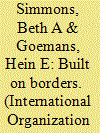

|
|
|
|
|
| Summary/Abstract |
The Liberal International Order is in crisis. While the symptoms are clear to many, the deep roots of this crisis remain obscured. We propose that the Liberal International Order is in tension with the older Sovereign Territorial Order, which is founded on territoriality and borders to create group identities, the territorial state, and the modern international system. The Liberal International Order, in contrast, privileges universality at the expense of groups and group rights. A recognition of this fundamental tension makes it possible to see that some crises that were thought to be unconnected have a common cause: the neglect of the coordinating power of borders. We sketch out new research agendas to show how this tension manifests itself in a broad range of phenomena of interest.
|
|
|
|
|
|
|
|
|
|
|
|
|
|
|
|
| 2 |
ID:
120641
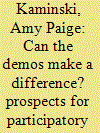

|
|
|
|
|
| Publication |
2012.
|
| Summary/Abstract |
US space exploration policy deliberations tend not to include citizens who lack direct, vested financial interests in the space enterprise. Could expanding the circle of US space policy development players to involve citizens more aptly serve space exploration and the interests of American democratic society in the 21st century? I evaluate the merits and feasibility of citizen participation, drawing upon democratic theory and scholarship analyzing public participation in techno-scientific matters, previous experiences of public involvement in space exploration policy formation, and reflections on my professional experiences in space policy development. I argue that public engagement will enrich the debate surrounding the US future in space and may point toward a program American citizens will support as a meaningful future in the cosmos. I suggest three guiding principles and outline four mechanisms that, if embraced by US space policy makers, could foster meaningful public participation in informing the US space exploration agenda.
|
|
|
|
|
|
|
|
|
|
|
|
|
|
|
|
| 3 |
ID:
171348


|
|
|
|
|
| Summary/Abstract |
What, if anything, is problematic about the involvement of celebrities in democratic politics? While a number of theorists have criticized celebrity involvement in politics, none so far have examined this issue using the tools of social epistemology, the study of the effects of social interactions, practices, and institutions on knowledge and belief acquisition. We will draw on these resources to investigate the issue of celebrity involvement in politics, specifically as this involvement relates to democratic theory and its implications for democratic practice. We will argue that an important and underexplored form of power, which we will call epistemic power, can explain one important way in which celebrity involvement in politics is problematic. This is because unchecked uses and unwarranted allocations of epistemic power, which celebrities tend to enjoy, threaten the legitimacy of existing democracies and raise important questions regarding core commitments of deliberative, epistemic, and plebiscitary models of democratic theory. We will finish by suggesting directions that democratic theorists could pursue when attempting to address some of these problems.
|
|
|
|
|
|
|
|
|
|
|
|
|
|
|
|
| 4 |
ID:
121590


|
|
|
|
|
| Publication |
2013.
|
| Summary/Abstract |
It is important to know what wealthy Americans seek from politics and how (if at all) their policy preferences differ from those of other citizens. There can be little doubt that the wealthy exert more political influence than the less affluent do. If they tend to get their way in some areas of public policy, and if they have policy preferences that differ significantly from those of most Americans, the results could be troubling for democratic policy making. Recent evidence indicates that "affluent" Americans in the top fifth of the income distribution are socially more liberal but economically more conservative than others. But until now there has been little systematic evidence about the truly wealthy, such as the top 1 percent. We report the results of a pilot study of the political views and activities of the top 1 percent or so of US wealth-holders. We find that they are extremely active politically and that they are much more conservative than the American public as a whole with respect to important policies concerning taxation, economic regulation, and especially social welfare programs. Variation within this wealthy group suggests that the top one-tenth of 1 percent of wealth-holders (people with $40 million or more in net worth) may tend to hold still more conservative views that are even more distinct from those of the general public. We suggest that these distinctive policy preferences may help account for why certain public policies in the United States appear to deviate from what the majority of US citizens wants the government to do. If this is so, it raises serious issues for democratic theory.
|
|
|
|
|
|
|
|
|
|
|
|
|
|
|
|
| 5 |
ID:
105252
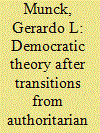

|
|
|
|
|
| Publication |
2011.
|
| Summary/Abstract |
Recent events across the globe make clear the complexities of the politics of "democratization" and the importance of developing nuanced and compelling understandings of these complexities. In Eurasia, "Color Revolutions" have given way to democratic disappointments and "authoritarian regimes." In north Africa, an unanticipated upsurge of democratic movements has felled autocrats in Tunisia and Egypt, but the political outcomes of these "transitions" are very much in doubt. Contemporary political science has developed an elaborate vocabulary for understanding such processes. And this vocabulary owes a great deal to a small group of scholars-Juan Linz, Guillermo O'Donnell, Philippe Schmitter, Alfred Stepan and Adam Przeworksi-who helped to lay the theoretical foundations of our current understanding of politics around the globe.
|
|
|
|
|
|
|
|
|
|
|
|
|
|
|
|
| 6 |
ID:
121403
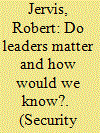

|
|
|
|
|
| Publication |
2013.
|
| Summary/Abstract |
This paper will explore the ambivalence or conflict in the literature about the extent to which leaders matter in international politics, commonly linked to the level-of-analysis question. One the one hand, national leaders are often larger than life figures with strong preferences and distinctive personalities who seem to leave their stamp on events. On the other hand, most ir scholars place great stress on the incentives and constraints posed by the environment, be it domestic or international. I will proceed in four sections. The first discusses the essential claims at stake, the kinds of evidence that could be adduced to support one position or the other, and the pathways by which individual differences can make themselves felt. The second section examines the implications for morality, responsibility, and democratic theory. This discussion too will point to relevant methods, including ones that are contested. I will then turn to post-Cold War American foreign policy, skeptically examine the claim that individual presidents, even George W. Bush, mattered as much as is generally believed and close by discussing the implications for democratic accountability and control.
|
|
|
|
|
|
|
|
|
|
|
|
|
|
|
|
| 7 |
ID:
094982
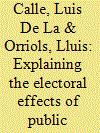

|
|
|
|
|
| Publication |
2010.
|
| Summary/Abstract |
According to the literature, governments have strong incentives to use the public budget tactically in order to either obtain the electoral support of new voters or strengthen the loyalty of their traditional supporters. Yet vote-seeking strategies only become rational when voters follow their self-interest and reward governments when their constituency benefits from public transfers. The literature has focused on the governments' incentives, largely ignoring the importance of knowing whether the electorate is responsive to public investments. This study tests empirically whether incumbents strategically use public investments to gather more electoral support; and whether voters take these investments into account at the polls. These two questions are pursued simultaneously by using as a case study the expansion of the underground network in Madrid, Spain. Only a little evidence is found to support the idea that regional governments constructed new metro stations in neighbourhoods where they had more to gain electorally. Also, the inauguration timing strictly followed the electoral cycle, something that indicates a strategic calculus on the part of the incumbent. However, the models are also consistent with the idea that the government's investments were primarily driven by motives of efficiency. Indeed, although governments are tempted to follow vote-seeking strategies, they are also aware that they cannot deviate too much from an efficiency-based allocation of public resources. From the perspective of the voters, robust evidence has been found to show that regional voters rewarded this policy at the neighbourhood level. Neighbourhoods that received new metro stations voted in higher numbers for the incumbent than those quarters without new investments. All in all, these findings may have some implications for normative democratic theory.
|
|
|
|
|
|
|
|
|
|
|
|
|
|
|
|
| 8 |
ID:
111574


|
|
|
|
|
| Publication |
2012.
|
| Summary/Abstract |
The article tackles some of the questions that arise from the invocation of "the people" in independence referendums in a contextualized way by examining the constitutional experience of two independence referendums: Quebec's unsuccessful independence referendum in 1995 and Montenegro's successful one in 2006. I argue that democratic theory does not presuppose the unified people as a decision-making unit, but rather that it conceals two, more logically primitive-and to an extent conflicted-general conceptions relevant to independence referendums. While not arbitrating between them, the concluding part argues that the tension in democratic theory ought to, at a minimum, contribute to reducing the vehemence of nationalist politics involved in attempts to achieve political independence.
|
|
|
|
|
|
|
|
|
|
|
|
|
|
|
|
| 9 |
ID:
121024
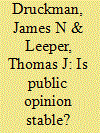

|
|
|
|
|
| Publication |
2012.
|
| Summary/Abstract |
Public opinion matters, both as a central element of democratic theory and as a substantive foundation for political representation. The origins and nature of public opinion have long attracted the attention of social scientists. Yet a number of questions remain; among the more perplexing is whether-and under what conditions-public opinion is stable. The answer depends in large part on whether one looks at aggregations of individual opinions (macro public opinion) or at the individual opinions themselves (micro public opinion). In this essay, we explore the macro/micro divide and offer a framework to determine when opinions are likely to be stable or volatile. This framework reflects both the content of the political environment and the nature of individuals' opinions. Using public opinion dynamics surrounding the Patriot Act as a primary example, we discuss the role of opinion stability in interpreting public opinion and in understanding the normative implications of public preferences.
|
|
|
|
|
|
|
|
|
|
|
|
|
|
|
|
| 10 |
ID:
085451
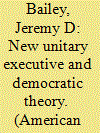

|
|
|
|
|
| Publication |
2008.
|
| Summary/Abstract |
Central to the recent argument from the "unitary executive" is the claim that the unitary executive is consistent with the text and history of the Constitution. But because this veracity and importance of this claim is contested, unitarians also argue that the unitary executive is consistent with democratic theory. This article examines that argument by addressing a question in the political thought of Alexander Hamilton. Although Hamilton was an important defender of an energetic executive, and is associated with an expansive interpretation of executive power, he wrote in The Federalist that the president and Senate would share the removal power. In contrast with existing scholarship, which either overlooks Hamilton's statement on removals or dismisses it as a careless error, this article argues that Hamilton's statement limiting presidential removals illuminates his larger argument about executive energy. By showing how "duration" would check "unity," this article clarifies Hamilton's political thought and offers an important critique of the modern argument from the unitary executive
|
|
|
|
|
|
|
|
|
|
|
|
|
|
|
|
| 11 |
ID:
118977
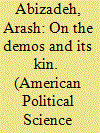

|
|
|
|
|
| Publication |
2012.
|
| Summary/Abstract |
Cultural-nationalist and democratic theory both seek to legitimize political power via collective self-rule: Their principle of legitimacy refers right back to the very persons over whom political power is exercised. But such self-referential theories are incapable of jointly solving the distinct problems of legitimacy and boundaries, which they necessarily combine, once it is assumed that the self-ruling collectivity must be a prepolitical, in principle bounded, ground of legitimacy. Cultural nationalism claims that political power is legitimate insofar as it expresses the nation's prepolitical culture, but it cannot fix cultural-national boundaries prepolitically. Hence the collapse into ethnic nationalism. Traditional democratic theory claims that political power is ultimately legitimized prepolitically, but cannot itself legitimize the boundaries of the people. Hence the collapse into cultural nationalism. Only once we recognize that the demos is in principle unbounded, and abandon the quest for a prepolitical ground of legitimacy, can democratic theory fully avoid this collapse of demos into nation into ethnos. But such a theory departs radically from traditional theory.
|
|
|
|
|
|
|
|
|
|
|
|
|
|
|
|
| 12 |
ID:
053830
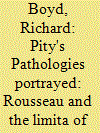

|
|
|
| 13 |
ID:
153763
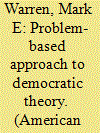

|
|
|
|
|
| Summary/Abstract |
Over the last few decades, democratic theory has grown dramatically in its power and sophistication, fueled by debates among models of democracy. But these debates are increasingly unproductive. Model-based strategies encourage theorists to overgeneralize the place and functions of ideal typical features of democracy, such as deliberation or elections. Here I sketch an alternative strategy based on the question: What kinds of problems does a political system need to solve to count as “democratic”? I suggest three general kinds: it should empower inclusions, form collective agendas and wills, and have capacities to make collective decisions. We can view common practices such as voting and deliberating as means for addressing these problems, and theorize institutional mixes of practices that would maximize a political system's democratic problem-solving capacities. The resulting theories will be both normatively robust and sufficiently fine-grained to frame democratic problems, possibilities, and deficits in complex polities.
|
|
|
|
|
|
|
|
|
|
|
|
|
|
|
|
| 14 |
ID:
092141
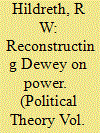

|
|
|
|
|
| Publication |
2009.
|
| Summary/Abstract |
One of the most enduring criticisms of John Dewey's political thought is that it is unsuspicious of power. This essay responds to this critique by advancing the claim that power is an integral but implicit element of Dewey's conception of human experience. Given Dewey's indirect treatment of power, this essay has two primary tasks. First, it reconstructs and develops an explicit conception of power for Deweyan pragmatism. Second, it evaluates the extent that Dewey's political and social philosophy is able to criticize power relations. Taken together, I aim to provide a more coherent and realistic defense of the political dimensions of Dewey's democratic theory. This defense moves Deweyan pragmatism toward a democratic politics that neither elides conflict nor evades power.
|
|
|
|
|
|
|
|
|
|
|
|
|
|
|
|
| 15 |
ID:
096547
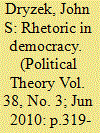

|
|
|
|
|
| Publication |
2010.
|
| Summary/Abstract |
Developments in the democratic theory of representation and deliberation enable renewed consideration of the ancient controversy over the proper place of rhetoric in politics. Rhetoric facilitates the making and hearing of representation claims spanning subjects and audiences divided in their commitments and dispositions. Deliberative democracy requires a deliberative system with multiple components whose linkage often needs rhetoric. Appreciation of these aspects of democracy exposes the limitations of categorical tests for the admissibility of particular sorts of rhetoric. Prioritization of bridging over bonding rhetoric is a step in the right direction, while sometimes producing misleading results. A better systemic test asks whether or not rhetoric promotes an effective deliberative system linking competent and reflective actors.
|
|
|
|
|
|
|
|
|
|
|
|
|
|
|
|
| 16 |
ID:
051224
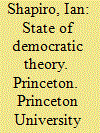

|
|
|
|
|
| Publication |
Princeton, Princeton University Press, 2003.
|
| Description |
xi, 183p.
|
| Standard Number |
0691115478
|
|
|
|
|
|
|
|
|
|
|
|
Copies: C:1/I:0,R:0,Q:0
Circulation
| Accession# | Call# | Current Location | Status | Policy | Location |
| 048177 | 321.8/SHA 048177 | Main | On Shelf | General | |
|
|
|
|
| 17 |
ID:
100336


|
|
|
| 18 |
ID:
140203
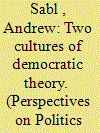

|
|
|
|
|
| Summary/Abstract |
Empirical political scientists and normative political theorists both seek to assess the quality of democracy. But they apply to this task very different criteria and assumptions. Empiricists (in particular those who study American politics) often assume that a—perhaps the—key indicator of democratic quality is responsiveness, the degree to which policy outcomes reflect public opinion. They often cite “democratic theory” as endorsing this criterion. Normative theorists, however, all but universally reject responsiveness, proposing instead very different criteria of democratic quality. I document a divide between two research cultures; trace some of its causes; and suggest some ways of overcoming it so that scholars on each side may benefit from the insights of the other. Empiricists, I argue, should acknowledge that the responsiveness criterion is neither value-neutral nor, in its pure form, particularly persuasive. Theorists adduce other criteria for sound and commonsensical reasons. In particular, to the extent that empiricists find that policy outcomes reflect not median voter preferences but either random factors or the concerns of the wealthy and organized, they would render their findings more compelling by presenting them as troubling according to a variety of persuasive democratic theories, not just a stylized theory that posits pure responsiveness as its ideal. Normative theorists, I argue, may learn from empiricists greater respect for ordinary citizens’ existing opinions, however imperfect the social and political circumstances in which they originate. and greater concern regarding empirical evidence that the median voter’s opinions may have little independent effect on policy. In spite of all this, the two cultures remain properly distinct in many respects. Some substantial differences in approach reflect a necessary, permanent, and salutary division of labor between two very different modes of studying democracy and assessing its quality.
|
|
|
|
|
|
|
|
|
|
|
|
|
|
|
|
| 19 |
ID:
088916
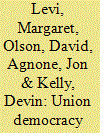

|
|
|
|
|
| Publication |
2009.
|
| Summary/Abstract |
Trade union leaders serve dual, seemingly contradictory roles. They must command militant organizations in conflicts with employers. Simultaneously, they must be accountable and democratically responsive to their members. Few unions possess the institutions or leadership to accomplish both. This article analyzes the practices of the International Longshore and Warehouse Union (ILWU), in which effective contract negotiation (including leadership during strikes) and an informed, active rank-and-file democracy are mutually supportive. We offer an alternative to standard accounts of union democracy. While the claims are based on a detailed case study, the theoretical model and its insights hold for labor unions and organizations more broadly.
|
|
|
|
|
|
|
|
|
|
|
|
|
|
|
|
| 20 |
ID:
109939
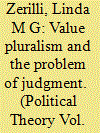

|
|
|
|
|
| Publication |
2012.
|
| Summary/Abstract |
This essay examines the significantly different approaches of John Rawls and Hannah Arendt to the problem of judgment in democratic theory and practice.
|
|
|
|
|
|
|
|
|
|
|
|
|
|
|
|
|
|
|
|
|